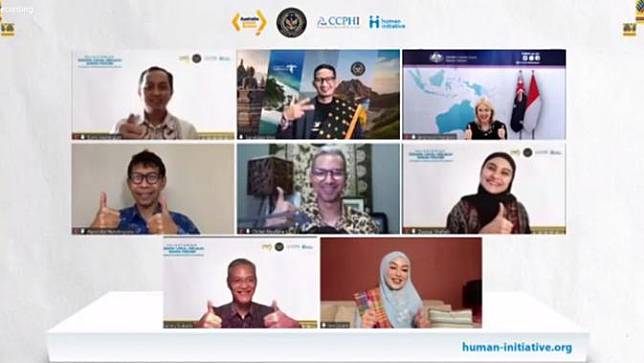
Human Inititaitive Holds a Webinar entitled Preserving Local Culture through Fashion Business
8 October 2021
Jakarta – Coinciding with National Weaving Day which falls on September 7, 2021, Human Initiative in cooperation with the Ministry of Tourism and Creative Economy of the Republic of Indonesia, Australia Global Alumni, and CCPHI collaborated to present a virtual event entitled “Preservation of Local Culture through Fashion Business.”
Broadcast live through Human Initiative’s, youtube and facebook channels, the event was attended by several speakers including Sony Sukada, the Executive Director of CCPHI, Handoko Hendroyono the CEO of M Bloc Space, Didiet Maulana an Indonesian IKAT Designer and entrepreneur educator, Zezee Shabab who is a public figure, and also Andreas Rafra, SH as the builder of weaving and the former Head of Village Head of Ketsoblak. In addition, it was also attended by Mr. Sandiaga Uno, the Minister of Tourism and Creative Economy of the Republic of Indonesia who acted as Keynote Speaker.
The event which started at 13.00 WIB was opened by Terry Putri as the host, followed by remarks by Mr. Tomy Hendrajati as the President of the Human Initiative. Tomy explained about Human Initiative community empowerment program in collaboration with various parties, especially with Australia Green Skin which was supported by Defat, PT Pertamina, and also involved weavers in the archipelago. Currently, the Human Initiative has started community empowerment which produces Pringgasela woven fabrics in East Lombok, Tanimbar Wayame Weaving in Maluku, and Equator weaving in Pontianak.
Furthermore, Bronwyn Robbins as Consul General of Australia in Makassar, conveyed the many efforts with the Australian alumni community in Eastern Indonesia, one of which was empowering the local weaver community in Pontianak. “This community is supported by the Pontianak regional government and also Human Initiative. The support provided includes training in weaving techniques and also access to various markets and to attract tourists to see the culture of Kalimantan,” said Bronwyn Robbins, the Australian Consul General in Makassar.
In the next session, the Minister of Tourism and Creative Economy of the Republic of Indonesia, Sandiaga Uno explained that Indonesia’s creative economy sector ranks the third place in the world, with a contribution of seven percent to the United Nations (UN), and has opened more than 20 million jobs. The culinary sector, the fashion sector, and the craft sector, which are the backbone of the economy, should be even more active in the era of digitalization. Fashion is one of the three sub-sectors that absorbs the highest labor, which is 17 percent, especially in the MSME sector. “I appreciate the human initiative for empowering women weaving craftsmen in the archipelago,” said Sandiaga Uno.
Entering the main agenda, namely the discussion session, Mr. Sony, who acted as the moderator, opened the discussion session by explaining the various types of weaving, each of which has a philosophy and story from the origin of the woven fabric itself. Indonesian woven fabrics have enormous potential. Preserving the woven fabrics of the archipelago, means that we also maintain the culture and wealth in it.
The discussion session started with a presentation from Mr. Handoko Hendroyono. He explained the process from upstream to downstream. From coffee plantations to coffee shops, also to fashion, especially weaving, from traditional local weavers to famous boutiques. Currently, locality is a new trend, fashion that has a sustainable approach for the user and the industry is a statement.
It was then followed by a presentation by Didiet Maulana who started the Indonesian IKAT business in 2011. Starting from his anxiety in 2010 there was a country that wanted to acquire Weaving as their cultural heritage, then IKAT Indonesia was born which became Mas Didit’s breakthrough to preserve Indonesian Weaving as a nation’s heritage. Didit has traveled around the archipelago to visit the weavers to jointly set the management pattern so that the weavers in the area can live properly. Didit during his visit also shared his knowledge of story telling so that weavers could tell the story behind the weaving motifs they made. “Because the story behind the weaving motif will give life to the fabrics themselves.”
Zezee Shahab, who was the last speaker at the discussion, gave a short message regarding mandatory tasks for artists and influencers to help promote, to help set an example for millennials today, “that Indonesian brands are no less cool than foreign brands,” Zezee Shahab concluded.
